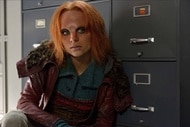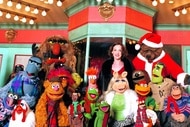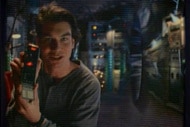Create a free profile to get unlimited access to exclusive videos, sweepstakes, and more!
Historical Dictionary of Science Fiction shows words like hoverboard & teleport are older than we thought

Ever wonder where words like “grok,” “blaster,” or “cryostasis” came from? Lexicographer Jesse Sheidlower sure did. And now, due to his efforts, anyone can look up these and other science fiction words in the Historical Dictionary of Science Fiction.
The free online dictionary has roughly 1,800 entries, and includes the lexicography and definitions for words like “antigravity,” “concrud,” and “fangirl.” Visitors to the site can search by word, scroll through the list alphabetically, or look at words tagged to specific categories like "SF Fandom," "Star Trek," or "Robotics."
Sheidlower, a lexicographer who used to be an editor at large at the Oxford English Dictionary, started the sci-fi dictionary while working there. He left the organization in 2013, but got permission from O.E.D. to pick up the project from them in early 2020.
The Historical Dictionary of Science Fiction is still a work in progress, but aficionados can already waste an hour or five pouring over the existing entries. “Teleport,” for example, a word one commonly connects with stories from the last century, can trace its roots back to 1878. “Warp Drive,” a word with strong connections to Star Trek, can be traced back to almost 20 years before the original series.
And what about "hoverboard," the floating skateboard that made Marty McFly the envy of every kid growing up in the late 1980s? The word showed up decades before its appearance in a 1988 script for Back to the Future II, specifically in Edward Jesby's 1964 short story “Sea Wrack.”
While the citations and the entries are plentiful, Sheidlower acknowledges that the dictionary is far from complete, especially if you’re looking at the softer side of science fiction (i.e., sci-fi that doesn’t focus on the hard sciences, like physics and astronomy). “The harder your science fiction, the more likely you are to be using terms other people are using,” he told The New York Times.
Star Wars, however, which is known to be more space opera (another entry in the dictionary) than hard sci-fi, still has nine entries of its own. Most of them (Padawan, Wookiee, carbonite) are Star Wars originals. The one exception, however, is “droid,” which dates back to 1952. It turns out C3PO and R2D2 have a lot more backstory than even the prequels suggested.


























